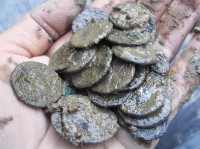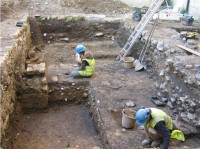 In a shocking departure from the usual way these announcements go, an actual professional archaeologist doing an actual professional excavation on a construction site in Bath, England has discovered a hoard of tens of thousands of Roman coins. Hazel O’Neill of Cotswold Archaeology found a block of silver coins fused together while digging on Beau Street in Bath, the future location of the main pool for the Gainsborough Hotel and Thermal Spa, in 2008. Metal detectors were not involved at any point.
In a shocking departure from the usual way these announcements go, an actual professional archaeologist doing an actual professional excavation on a construction site in Bath, England has discovered a hoard of tens of thousands of Roman coins. Hazel O’Neill of Cotswold Archaeology found a block of silver coins fused together while digging on Beau Street in Bath, the future location of the main pool for the Gainsborough Hotel and Thermal Spa, in 2008. Metal detectors were not involved at any point.
The coins were discovered in a small pit under what was once the floor of a Roman building about 450 feet from the famous Roman Bath after which the town was named. Archaeologists think the coins were kept in a wooden box or cloth bag which has now rotted away leaving only the stuck together coins behind.
During excavation 150 coins were dislodged. Based on the size and number of those coins, the earliest estimates of the total number were fairly low at 1,000 pieces, but the fused block was deceptive. Estimates now put the total number of coins at around 30,000. If that figure is correct, this will be the fifth largest hoard of Roman coins ever discovered in Britain and the largest hoard ever discovered in a Roman town in Britain.
 The entire block was cut out of the soil and sent to a Cotswold Archaeology laboratory for storage and preliminary research. They have now forwarded the coins, most of them still fused together, to the British Museum where their experts will separate and conserve the coins. The project is expected to take at least a year.
The entire block was cut out of the soil and sent to a Cotswold Archaeology laboratory for storage and preliminary research. They have now forwarded the coins, most of them still fused together, to the British Museum where their experts will separate and conserve the coins. The project is expected to take at least a year.
From what archaeologists have been able to tell thus far, the coins date to the early and middle 3rd century A.D., the same dates as the coins in the Frome Hoard. Despite these recent bonanzas, the period between 240 and 260 A.D. is generally underrepresented in coin hoards especially considering what a politically volatile time it was. Two of the loose coins have been identified as Antoninianii, a debased silver coin worth two denarii issued by 3rd century emperors starting with Caracalla until Diocletian began his program of coinage reform in 301 A.D.
The find has been declared a treasure trove by the coroner as required by law. It has not been formally valued yet, but that’s the next step. Meanwhile The Roman Baths is wasting no time in launching a fund-raising project to secure the £150,000 they think they’ll need to purchase the hoard for conservation and display in Bath. They don’t appear to have an easy online donation system set up yet, but you can call in your credit card number or mail them a check if you’d like to help.